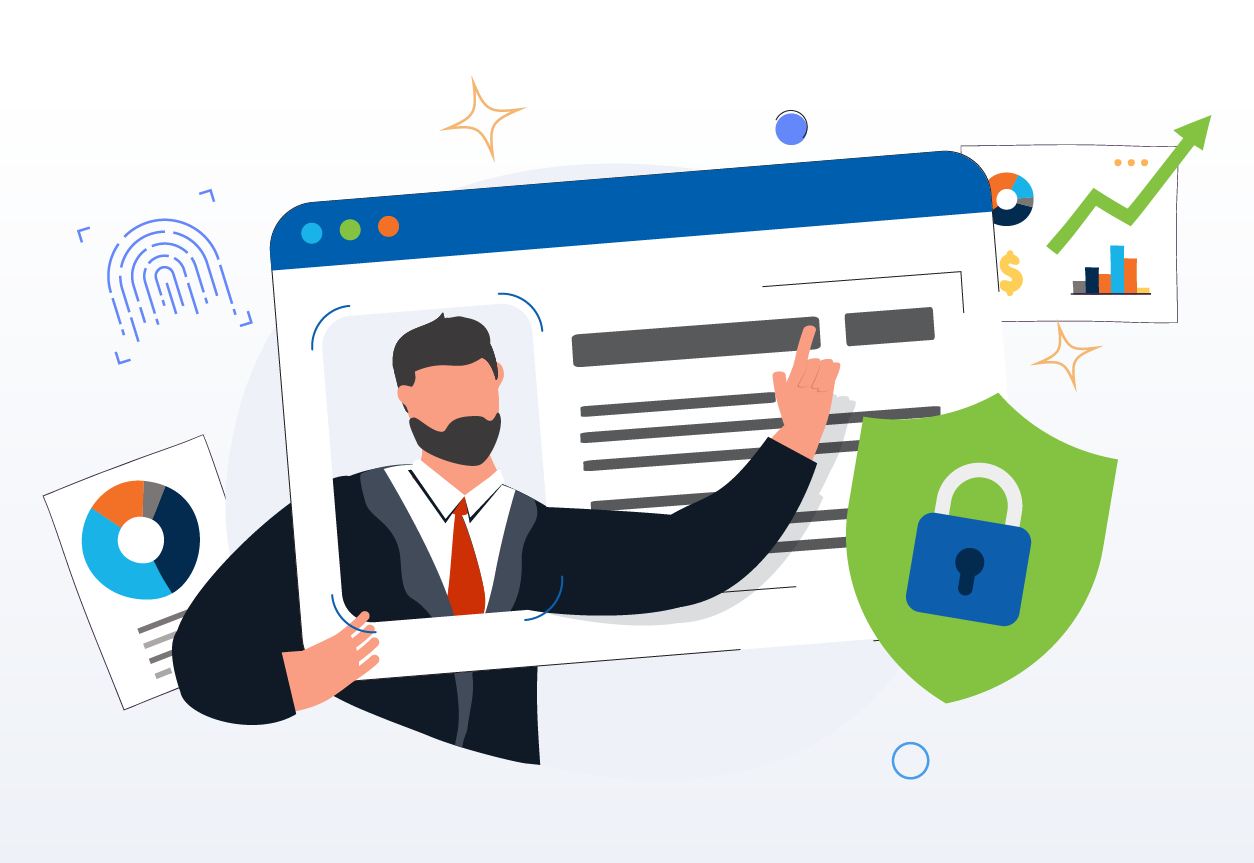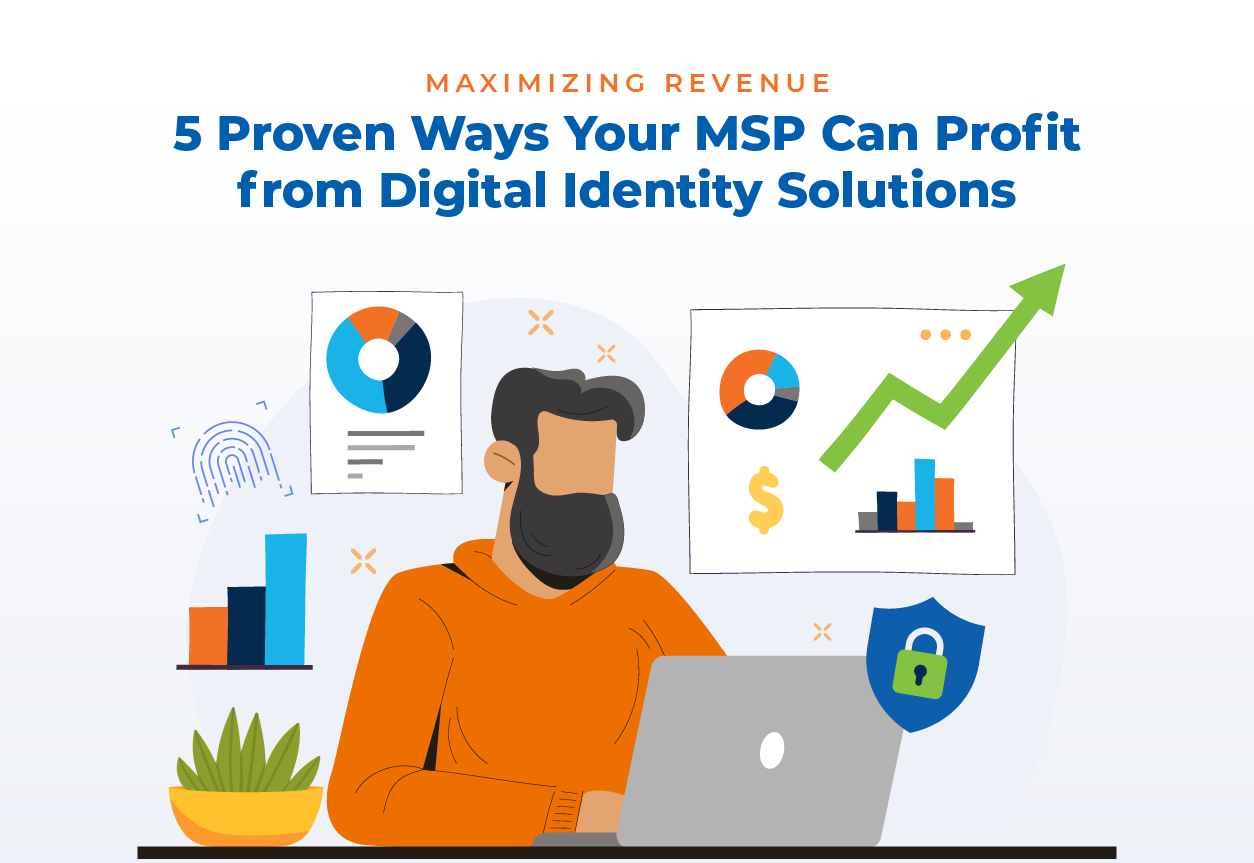Protecting and maintaining digital identities has become a pressing priority for organisations, correlating with a noticeable rise in identity theft and identity-based cyberattacks in recent years.
With more businesses seeking secure and seamless online experiences for their employees and customers, offering identity management solutions as part of your MSP service portfolio can introduce new opportunities and spark growth.
This comprehensive guide covers five strategies that enable MSPs to leverage identity management solutions and capitalise on the burgeoning digital identity market, enhancing both their service offerings and revenue streams.
5 Proven Ways Your MSP Can Profit from Digital Identity Solutions
1. Diversifying Your Service Portfolio
Adding identity management solutions to your MSP portfolio enables you to diversify your offerings and cater to the urgent needs of different clients.
With digital identity solutions, you will be able to enhance your customer’s cyber threat mitigation and help earn their trust with a proactive approach.
It also seamlessly complements existing MSP solutions, creating a more holistic end-to-end security ecosystem for your clients. By integrating identity management into your clients’ security strategy, you can significantly improve their access controls and authentication authorisation processes, fortifying them against unauthorised access and data breaches. This not only strengthens their cybersecurity but also streamlines operations, enhancing overall efficiency. This becomes more relevant with the growing shift to cloud technologies that necessitate more strict control over online identities.
2. Enhancing Security and Compliance Offerings
Digital identity services help you strengthen your clients’ security posture and add more layers of security to protect data and safeguard identities.
Many businesses in critical industries like healthcare and finance must comply with strict regulatory requirements regarding data protection and user authentication, such as HIPAA and PCI-DSS. As an MSP, offering digital identity services can help your clients achieve and maintain compliance with these regulations, establishing yourself as a leader in the cyber security and digital identity domains.
3. Building Recurring Revenue Streams
Offering identity management solutions to clients can be a strategic move for your MSP to build recurring revenue streams through subscription models and managed services.
Identity management plays a crucial role in securing digital assets, ensuring compliance, and streamlining user access. This makes it an essential service for various organisations.
By structuring your identity management services as subscription-based offerings, you can charge clients a regular fee for ongoing access to the solution, providing predictable and consistent revenue. This can also make it easier for you to plan and manage your resources.
Further, you can design your identity management solutions to be scalable according to your clients’ business needs and business growth rate, with tiered subscription plans based on the number of users, features, and level of support.
And since identity management solutions are typically offered as part of a managed service that includes continuous monitoring, maintenance, and support, you will be able to create a sustained revenue stream as clients rely on your MSP for regular updates, troubleshooting, and improvements.
Furthermore, regularly updating and enhancing your identity management solutions with new features and improvements will also give your clients reasons to maintain their subscriptions, fostering long-term relationships.
4. Gaining a Competitive Edge
Offering digital identity solutions aids in positioning your MSP as a proactive and forward-thinking partner to potential customers, attracting clients seeking advanced identity protection measures to establish online trust. This competitive edge not only safeguards clients' digital assets but also cements your position as a leader in delivering secure and efficient IT services.
Moreover, digital identity services empower your MSP to enhance your clients’ security and streamline their operations with robust authentication, efficient identity certificate management, and identity-based access controls, which significantly reduce the risk of unauthorised access and data breaches and foster client trust.
5. Cross-Selling Opportunities
Offering digital identity management solutions along with other security services enables you to improve your customers’ network and overall IT infrastructure, opening new opportunities for cross-selling.
For instance, some of your existing clients may have identity-related vulnerabilities, allowing you to propose supplementary services to close these gaps and provide more comprehensive protection.
And since your customers already trust you, they will be more inclined to benefit from additional value-adding services to bolster their organisations’ security.
The key here is to accurately communicate the importance of digital identity services and how they contribute to better security and increased online trust. Such an approach can also help you retain existing clients and boost customer loyalty.

How to Market Digital Identity Services to Prospective Customers
A well-structured marketing plan is crucial for the success of your MSP digital identity services. Consider the following steps when marketing your offerings to prospective cleans:
1. Set Clear Goals and Objectives. Define clear goals for your marketing efforts. Depending on the size and needs of your MSP business, the primary objective can be increasing website traffic, generating leads, or closing sales.
2. Identify Key Performance Indicators (KPIs). Establish KPIs to measure the success of your marketing activities. Track metrics such as website traffic, conversion rates, and social media engagement to gauge the effectiveness of your campaigns.
3. Segment Your Audience. Divide your target audience into segments based on demographics, industry, or specific needs. Tailor your marketing messages to resonate with each segment, maximising the impact of your communication.
4. Choose the Right Channels. Where do your target customers spend time the most? Select the most effective channels to reach your target audience. This may include a mix of online and offline channels such as social media, email marketing, content marketing, and industry events.
5. Create Targeted, Value-Adding Content. Develop high-quality content that speaks directly to your audience's pain points and interests. Utilise blog posts, whitepapers, case studies, and visual content to build relationships with your customers.
6. Allocate Budget Wisely. Determine a budget that aligns with your marketing goals. Allocate resources to the channels and activities that are most likely to yield positive results. Regularly evaluate and adjust your budget based on performance data.
7. Monitor and Adjust. Continuously monitor the performance of your marketing efforts and use analytics tools to track vital metrics and gather insights. Be ready to adjust your strategy based on what is working and what needs improvement.
On top of that, you can leverage the certificate authority’s MSP resources. GlobalSign offers extensive support resources for MSP partners, which include:
-
Leading Security Solutions: GlobalSign's digital identity solutions offer cutting-edge security features that help protect your clients’ businesses from cyber threats and ensure data integrity.
-
Financial Incentives: GlobalSign offers financial incentives for their MSP partners, such as discounts and referral programs.
-
Automation Technologies: GlobalSign automation technologies provide efficiency gains for you and your clients by simplifying processes, limiting manual workload, and enhancing overall productivity.
-
Extensive Technical Support: GlobalSign offers robust technical support that gives you access to expert assistance, fostering confidence in the reliability of your digital identity solutions.
-
Sales Training: Take advantage of GlobalSign's sales training resources to empower your team with the knowledge and skills to effectively communicate the value of digital identity services.
Conclusion
To recap, embracing digital identity solutions can offer a plethora of opportunities and advantages for your MSP business.
Diversifying your service portfolios positions your MSP as a comprehensive solution provider, meeting your evolving client needs.
Integrating digital identity services, particularly in security and compliance, enhances data protection and regulatory adherence for your customers, establishing your MSP as an invaluable partner in regulated sectors. It also creates cross-selling opportunities with your existing client base, increasing customer loyalty and trust. Not to mention, by utilising subscription models, you can create steady revenue streams and ensure financial stability.
Ready to get started? Check out our FREE white paper to learn how to craft a profitable digital identity plan for your MSP business.






